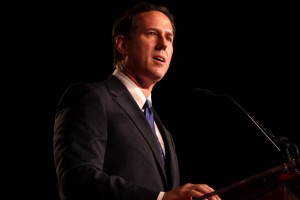
Last night, Rick Santorum became the latest casualty of the 2016 election cycle when he announced he was officially suspending his presidential campaign. Despite finishing second overall in 2012, Santorum never got off the ground in 2016. What happened?
1. The media and the RNC happened.
The two-tiered debates were bad in theory and even worse in practice. At the beginning, we had over a dozen legitimate candidates and a couple borderline legitimate candidates (George Pataki and Jim Gilmore). By using national polls to determine who got into the primetime debates, the media had its own primary and told voters who they wanted to hear from, not the other way around. And to make matters worse, the RNC — which is supposed to support all candidates and let the voters narrow the field down — cooperated with the media.
The two-tier debates could have been workable if the “undercard” debates were given a fair amount of coverage. Instead, the networks barely advertised the undercards, and spent the day talking about who needed to do what in the primetime debate and basically ignoring the undercard debates. I watched most of the undercards, and I found them to be far more substantive and interesting than the primetime circuses. There were so many fresh conservative ideas put forth by Santorum, Bobby Jindal, Mike Huckabee, Carly Fiorina, and others that simply never got talked about.
The result was decreased visibility for Santorum (and the other candidates relegated to the undercards). Santorum was doing respectably in the early polls in the summer, matching the numbers for candidates like Chris Christie, Rand Paul, Jeb Bush, and even Ted Cruz. But after the debate season started, Santorum’s polls stayed permanently down, and a cycle emerged — the media shut him out of the debates because his national poll numbers were too low, but there was no way to get his national poll numbers up if he wasn’t seen with everyone else. Then voters told him he was too low in the polls for them to consider him.
The way the RNC, in tandem with the media, treated the 2012 runner-up who nearly toppled Mitt Romney was disgraceful. (Perhaps the fact that he did almost topple Mitt Romney had something to do with his treatment.)
2. Donald Trump happened.
After Trump made his first immigration comments, all the media could talk about was Trump, Trump, Trump. All the oxygen was sucked out of the room, and it has been tough for top candidates like Rubio and Cruz to break through. In a couple of the relative few interviews the media granted Santorum, they would ask why he wasn’t getting the support typical of a runner-up. I wanted to shout through the TV, “because all you can talk about is Trump!” The networks broke in to show Trump rallies for an hour at a time, allowed him to phone in to the Sunday shows (which no other candidate is allowed to do), and talked to other candidates only so they could ask them about Trump.
This is a different election — never has there been a celebrity with 100 percent name recognition running in a primary, and never has there been so much anger and dissatisfaction with Washington, DC. If this was a more traditional election, perhaps things would be different, but unfortunately for Santorum, and for better or for worse for the party at large, this is a different election.
3. He didn’t keep his profile high enough between the 2012 and 2016 races.
Now I’m going to criticize something Santorum did (or didn’t do), rather than something done to him. As the second place candidate, he couldn’t be blamed for thinking he had established himself in the minds of voters as a strong prospect going forward. But new, shiny faces that were too inexperienced to run in 2012 immediately started positioning themselves for 2016.
The candidates who are/were in elected office (Rubio, Cruz, Scott Walker, Rick Perry, Christie, John Kasich, Paul, Jindal) had a natural platform — their office — to keep themselves in front of voters. The non-office holders had their own advantages — Bush had his name, Ben Carson had a book and a TV movie, Huckabee had his own TV show, and Trump was Trump. Santorum had no real platform from which to reach voters and had to forge his own. He founded a non-profit, Patriot Voices, and wrote two books, but that wasn’t enough to compete with the media darlings.
It should also be noted that Santorum is probably the least personally wealthy candidate to have run in this election. He actually had to work and earn money to put several of his kids through college. He couldn’t spend two or three years unemployed traveling the country. The elected candidates had large salaries; Huckabee had a lucrative contract with Fox News; and Trump, Bush, Fiorina, and Carson are all personally wealthy. Santorum had to get a job. (And he got a good one — CEO of EchoLight Studios, a start-up that makes quality faith-based movies.)
So what could Santorum have done differently? He should have kept himself in the national conversation by commentating on political developments, going to Washington to stand against Obamacare with Cruz, etc. Alas, he did not, and perhaps he could not, but it is what it is.
4. Other candidates poached parts of his message.
In 2012, the Democrats had their playbook against Mitt Romney written years in advance, and they immediately put it into action — Romney is too rich, doesn’t care about working people, blah blah blah. They didn’t have a playbook for Santorum, and they actually weren’t sure how to handle him if he was able to beat Romney. Santorum offers a unique blend of conservatism with a principled populist streak. Yes, he’s a strong social conservative and a foreign policy hawk, but he also understands the plight of middle America.
The GOP doesn’t engage the regular working class American who feels left behind in today’s economy. For people who have stock, things have been going well for the last few years, but the rest of America has been hollowed out as manufacturing jobs went overseas and mom-and-pop shops were run out of business by big box stores. Barack Obama planned his 2012 message around hammering Republicans for being out of touch with the working class, but Santorum was actually in touch.
Santorum is still the only one of the candidates who really understands and articulates what’s going on with ordinary middle-class Americans, but other candidates poached parts of his message. Santorum wrote a book called Blue Collar Conservatives in 2014 that called attention to these problems and how the GOP can appeal to these folks. And believe it or not, Trump read the book, and started pushing Santorum’s ideas as his own. Cruz started focusing his message on Reagan Democrats, the people who elected Rick Santorum in a blue state (Pennsylvania) multiple times. Huckabee re-focused his campaign around his blue-collar appeal, as did Kasich (though Kasich’s claims to blue-collar credibility are dubious).
Am I saying that the other candidates stole Santorum’s message and ran with it? No, but they took some key parts of it. And I suppose that’s good for the ideas, but Santorum is the best one to articulate them, and he has been drowned out.
Santorum is a conservative warrior and a fundamentally good and decent man who bears many scars from years of taking on the left. It is a shame that he was treated so poorly by the media and party establishment this election.
Thomas Valentine is a researcher for the American Principles Project and a junior at the Franciscan University of Steubenville.


